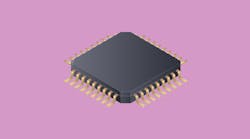Google Partners With SkyWater to Drive Open-Source Chip Design
SkyWater Technology said it will work with Alphabet’s Google to expand on an open-source chip design project with funding from the US Department of Defense.
SkyWater said that it landed $15 million in funding from the DoD to develop a new open-source chip design platform powered by Google for its 90-nm process technology, which could give the U.S. military a new way to procure U.S.-made chips in the future.
This is not the first time SkyWater and Google have partnered on a project like this. The two companies previously partnered to enable the open source design of custom application-specific integrated circuits (ASICs) on the former's 130-nm mixed-signal CMOS process node.
The new open-source offering to be co-developed with Google, called SKY90-FD, will be based on SkyWater's 90-nm fully depleted silicon on insulator (FDSOI) technology developed at MIT’s Lincoln Laboratory
While the fabrication process itself is not open source, the process design kit (PDK) is. A PDK is a set of files that a foundry shares with its customers to describe the building blocks of a specific production process.
The PDK, which interfaces with electronic-design automation (EDA) software, also covers the rules chip engineers have to follow during the design process. Customers use the PDK to design, simulate, and verify a chip design before sending the blueprint over to the foundry to build prototypes or ramp up production.
Designing a chip is a very expensive proposition. High-end electronic design automation (EDA) software is also expensive to buy. Having test chips manufactured by a foundry can cost tens of thousands or millions of dollars—an expense that open-source chip design tools, including PDKs, could help ease. SkyWater was founded back in 2017 and is currently the only pure-play chip foundry owned by U.S. investors.
The new partnership is intended to enable a new pipeline to create intellectual property (IP) and speed up innovation in chips while opening the door for more affordable custom chip production, SkyWater said.
Open-source software is playing a growing role in mission-critical aerospace and defense systems designed by and for the Department of Defense. The DoD said a major advantage of open-source technology is transparency, making it easier to identify design flaws and malicious code, which is not always possible with proprietary software.
But as the U.S. stares down its deteriorating ability to make chips at home, the DoD hopes to bring the benefits of open source to silicon. Matthew Kay, head of the new open-source silicon program at the DoD, said public-private partnerships such as the one with Google and SkyWater are key to improving "our defensive posture for the future" and locking in a reliable source of US-made chips for military use.
Google is investing in open silicon to drive down costs over time and reduce the many obstacles facing hardware startups and non-traditional chip designers that could become assets for Google in the future.
The open-source model taps into a talent pool of software engineers to design chips in code and run design simulations that test, fine-tune, and validate chip designs. As a result, chip engineers can iterate and innovate faster and even tape-out test chips more frequently.
Will Grannis, CEO of Google's newly created Public Sector division, said the public-private partnership with the DoD and SkyWater represents a new era in accessible chip design driven by an open-source approach.
"Our collaboration will help address the historical limitations of chip design and production for national defense by improving accessibility for researchers and developers to innovate far faster and at lower costs,” Grannis said.
The $15 million funding from the Pentagon is part of a previously announced $27 million package for U.S.-owned SkyWater, an upstart in the fast-growing $100 billion foundry business. Part of the funding will also be used to develop a 90-nm rad-hard process. Called RH90, the technology is designed for radiation-hardened electronics that can handle the harsh conditions in space and even in medical settings.
“This will expand our 90-nm foundry offering as a platform for innovation and productization here in the U.S.," said SkyWater CEO Thomas Sonderman.

